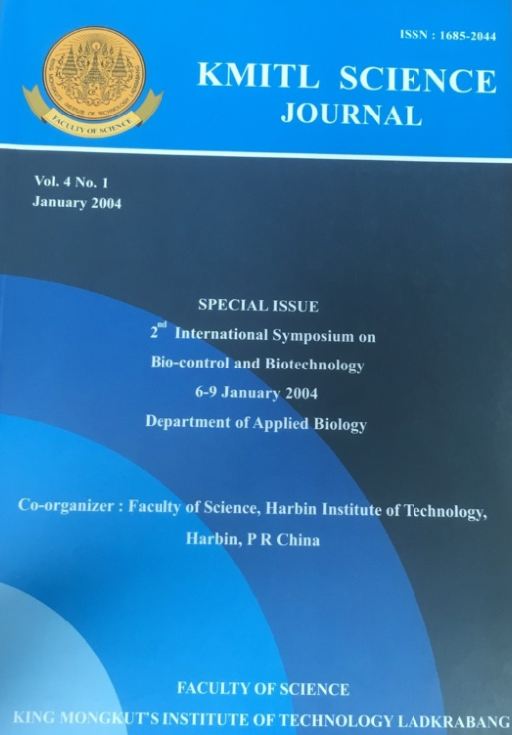Optimal Condition for Chromosomal Imbalances Analysis of Cancer Genome by Comparative Genomic Hybridization
Main Article Content
Abstract
Comparative Genomic Hybridization (CGH) is a technique for analysis of copy number changes throughout the genome based on the hybridization of differentially labeled tumor (test DNA) and normal DNA (reference DNA) to normal human metaphase chromosome (target DNA). In this report, we suggested some critical steps such as metaphase preparation and an average fragment length of DNA probe which obtains a uniform and intense hybridization signal. CGH technique will show gain and loss of DNA sequence regions in cancer genome. Those regions may harbor candidate genes such as oncogenes and tumor suppressor genes playing important roles in the initiation and progression of cancer.
Keywords: chromosome imbalances, comparative genomic hybridization, cancer genome
Corresponding author: E-mail: cast@kmitl.ac.th
Article Details
Copyright Transfer Statement
The copyright of this article is transferred to Current Applied Science and Technology journal with effect if and when the article is accepted for publication. The copyright transfer covers the exclusive right to reproduce and distribute the article, including reprints, translations, photographic reproductions, electronic form (offline, online) or any other reproductions of similar nature.
The author warrants that this contribution is original and that he/she has full power to make this grant. The author signs for and accepts responsibility for releasing this material on behalf of any and all co-authors.
Here is the link for download: Copyright transfer form.pdf
References
[2] Gebhart, E. and Liehr, T. Patterns of genomic imbalances in human solid tumors (Review), International Journal of oncology, 16(2), 2000, 383-399.
[3] Hermsen, M.A., Meijer, G.A., Baak, J.P., Joenje, H. and Walboomers, J.J. Comparative genomic hybridization: a new tool in cancer pathology, Human Pathology, 27(4), 1996, 342-349.
[4] Kallionimie, O-P., Kallionimie, A., Piper, J., Isola, J., Waldman, F.M., Gray, J.W. and Pinkel, D. Otimizing comparative genomic hybridization for analysis of DNA sequences copy number changes in solid tumors, Gene Chromosomes Cancer, 10, 1994, 231-243.
[5] Karhu, R., Kahkonen, M., Kuukasjarvi, T., Pennanen, S., Tirkkonen, M. and Kallioniemi, O-P. Quality control of CGH: Impact of metaphase chromosomes and the dynamic range of hybridization, Cytometry, 28, 1997, 198-205.
[6] Houldworth, J. and Chaganti, R.S.K. Comparative genome hybridization : an overview, American Journal of Pathology, 145, 1994, 1253-1260.
[7] Ried, T., Knutzen, R., Steinbeck, R., Blegen, H., Schrock, E., Heselmeyer, K., du Manoir, S. and Auer, G. Comparative genomic hybridization reveals a specific pattern of chromosomal gains and losses during the genesis of colorectal tumors, Genes Chromosomes Cancer, 15(4), 1996, 234-245.
[8] Schlegel, J., Stumm, G., Scherthan, H., Bocker, T., Zirngibl, H., Ruschoff, J. and Hofstadter, F. Comparative genomic in situ hybridization of colon carcinomas with replication error, Cancer Research, 55, 1995, 6002-6005.


